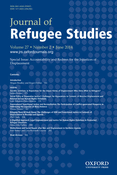-
Views
-
Cite
Cite
Huma Haider, Transnational Transitional Justice and Reconciliation: The Participation of Conflict-generated Diasporas in Addressing the Legacies of Mass Violence, Journal of Refugee Studies, Volume 27, Issue 2, June 2014, Pages 207–233, https://doi.org/10.1093/jrs/feu002
Close - Share Icon Share
Abstract
Diaspora communities often develop as a consequence of forced migration. The term ‘conflict-generated diaspora’ has been used to refer to those who fled as refugees. There has been limited consideration of the involvement of conflict-generated diasporas in transitional justice and reconciliation processes that seek to address the legacies of conflict. This article aims to address this gap. Drawing on the concept of transnationalism, it explores the connections of diaspora groups to their home countries and to the conflicts they experienced. In particular, it examines the ways in which such groups have been involved in transitional justice and reconciliation processes and activities. These activities may emerge from diaspora mobilization or may be facilitated through host country, home country or transitional justice policies. The article argues that the involvement of the diaspora in such activities could contribute to alleviating commonly neglected traumas and divisions in diaspora communities. It could also result in more effective transitional justice outcomes, through greater inclusiveness and more comprehensive truth-telling, and progress in processes of reconciliation.


